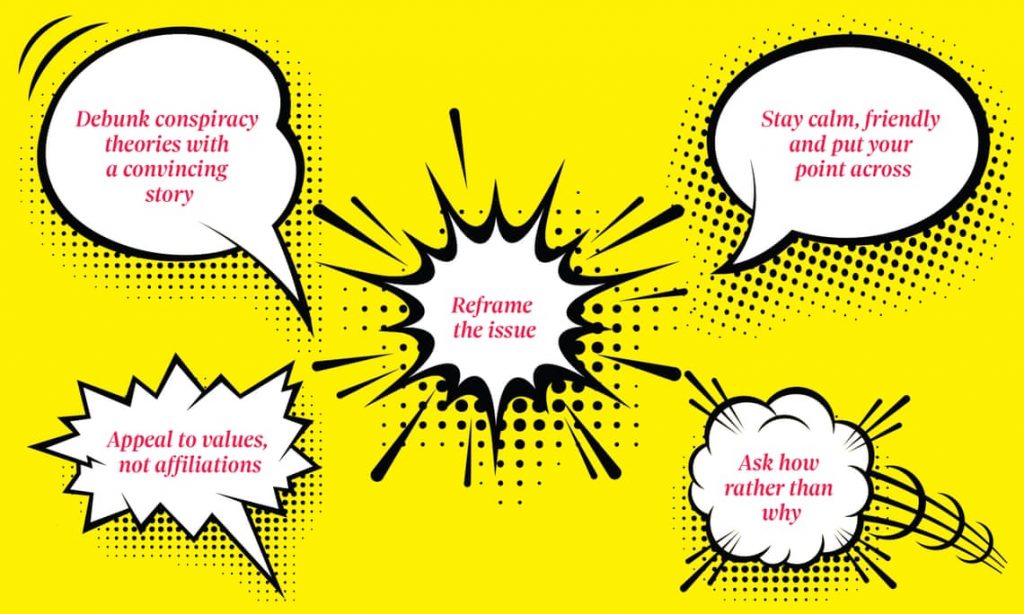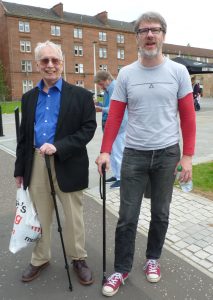https://www.thenational.scot/news/17911721.lesley-riddoch-39-s-far-yes-side-come-five-years/

Voters who were once supremely sceptical about independence are now overwhelmingly sceptical about the mainstays of the Union.
Campaigning for an independent Scotland
https://www.thenational.scot/news/17911721.lesley-riddoch-39-s-far-yes-side-come-five-years/

Voters who were once supremely sceptical about independence are now overwhelmingly sceptical about the mainstays of the Union.
https://www.theguardian.com/science/2019/jun/30/the-science-of-influencing-people-six-ways-to-win-an-argument

Hidebound views on subjects such as the climate crisis and Brexit are the norm – but the appliance of science may sway stubborn opinions
“I am quite sure now that often, very often, in matters of religion and politics a man’s reasoning powers are not above the monkey’s,” wrote Mark Twain.
Having written a book about our most common reasoning errors, I would argue that Twain was being rather uncharitable – to monkeys. Whether we are discussing Trump, Brexit, or the Tory leadership, we have all come across people who appear to have next to no understanding of world events – but who talk with the utmost confidence and conviction. And the latest psychological research can now help us to understand why.
Consider the “illusion of explanatory depth”. When asked about government policies and their consequences, most people believe that they could explain their workings in great detail. If put to the test, however, their explanations are vague and incoherent. The problem is that we confuse a shallow familiarity with general concepts for real, in-depth knowledge.
Besides being less substantial than we think, our knowledge is also highly selective: we conveniently remember facts that support our beliefs and forget others. When it comes to understanding the EU, for instance, Brexiters will know the overall costs of membership, while remainers will cite its numerous advantages. Although the overall level of knowledge is equal on both sides, there is little overlap in the details.
Simply asking why people support or oppose a policy is pointless. You need to ask how something works to have an effect
Politics can also scramble our critical thinking skills. Psychological studies show that people fail to notice the logical fallacies in an argument if the conclusion supports their viewpoint; if they are shown contrary evidence, however, they will be far more critical of the tiniest hole in the argument. This phenomenon is known as “motivated reasoning”.
A high standard of education doesn’t necessarily protect us from these flaws. Graduates, for instance, often overestimate their understanding of their degree subject: although they remember the general content, they have forgotten the details. “People confuse their current level of understanding with their peak knowledge,” Prof Matthew Fisher of Southern Methodist University in Dallas, Texas, says. That false sense of expertise can, in turn, lead them to feel that they have the licence to be more closed-minded in their political views – an attitude known as “earned dogmatism”.
Little wonder that discussions about politics can leave us feeling that we are banging our heads against a brick wall – even when talking to people we might otherwise respect. Fortunately, recent psychological research also offers evidence-based ways towards achieving more fruitful discussions.
Thanks to the illusion of explanatory depth, many political arguments will be based on false premises, spoken with great confidence but with a minimal understanding of the issues at hand. For this reason, a simple but powerful way of deflating someone’s argument is to ask for more detail. “You need to get the ‘other side’ focusing on how something would play itself out, in a step by step fashion”, says Prof Dan Johnson at Washington and Lee University in Lexington, Virginia. By revealing the shallowness of their existing knowledge, this prompts a more moderate and humble attitude.
In 2013, Prof Philip Fernbach at the University of Colorado, Boulder, and colleagues asked participants in cap-and-trade schemes – designed to limit companies’ carbon emissions – to describe in depth how they worked. Subjects initially took strongly polarised views but after the limits of their knowledge were exposed, their attitudes became more moderate and less biased. Advertisement
It’s important to note that simply asking why people supported or opposed the policy – without requiring them to explain how it works – had no effect, since those reasons could be shallower (“It helps the environment”) with little detail. You need to ask how something works to get the effect.
If you are debating the merits of a no-deal Brexit, you might ask someone to describe exactly how the UK’s international trade would change under WTO terms. If you are challenging a climate emergency denier, you might ask them to describe exactly how their alternative theories can explain the recent rise in temperatures. It’s a strategy that the broadcaster James O’Brien employs on his LBC talk show – to powerful effect.
If you are trying to debunk a particular falsehood – like a conspiracy theory or fake news – you should make sure that your explanation offers a convincing, coherent narrative that fills all the gaps left in the other person’s understanding.
Consider the following experiment by Prof Brendan Nyhan of the University of Michigan and Prof Jason Reifler of the University of Exeter. Subjects read stories about a fictional senator allegedly under investigation for bribery who had subsequently resigned from his post. Written evidence – a letter from prosecutors confirming his innocence – did little to change the participants’ suspicions of his guilt. But when offered an alternative explanation for his resignation – to take on another role – participants changed their minds. The same can be seen in murder trials: people are more likely to accept someone’s innocence if another suspect has also been accused, since that fills the biggest gap in the story: whodunnit.
The persuasive power of well-constructed narratives means that it’s often useful to discuss the sources of misinformation, so that the person can understand why they were being misled in the first place. Anti-vaxxers, for instance, may believe a medical conspiracy to cover up the supposed dangers of vaccines. You are more likely to change minds if you replace that narrative with an equally cohesive and convincing story – such as Andrew Wakefield’s scientific fraud, and the fact that he was set to profit from his paper linking autism to MMR vaccines. Just stating the scientific evidence will not be as persuasive.
Each of our beliefs is deeply rooted in a much broader and more complex political ideology. Climate crisis denial, for instance, is now inextricably linked to beliefs in free trade, capitalism and the dangers of environmental regulation.
Attacking one issue may therefore threaten to unravel someone’s whole worldview – a feeling that triggers emotionally charged motivated reasoning. It is for this reason that highly educated Republicans in the US deny the overwhelming evidence.
You are not going to alter someone’s whole political ideology in one discussion, so a better strategy is to disentangle the issue at hand from their broader beliefs, or to explain how the facts can still be accommodated into their worldview. A free-market capitalist who denies global warming might be far more receptive to the evidence if you explain that the development of renewable energies could lead to technological breakthroughs and generate economic growth.
If the attempt to reframe the issue fails, you might have more success by appealing to another part of the person’s identity entirely.
Someone’s political affiliation will never completely define them, after all. Besides being a conservative or a socialist, a Brexiter or a remainer, we associate ourselves with other traits and values – things like our profession, or our role as a parent. We might see ourselves as a particularly honest person, or someone who is especially creative. “All people have multiple identities,” says Prof Jay Van Bavel at New York University, who studies the neuroscience of the “partisan brain”. “These identities can become active at any given time, depending on the circumstances.”
You are more likely to achieve your aims by arguing gently and kindly. You will also come across better to onlookers
It’s natural that when talking about politics, the salient identity will be our support for a particular party or movement. But when people are asked to first reflect on their other, nonpolitical values, they tend to become more objective in discussion on highly partisan issues, as they stop viewing facts through their ideological lens.
You could try to use this to your advantage during a heated conversation, with subtle flattery that appeals to another identity and its set of values; if you are talking to a science teacher, you might try to emphasise their capacity to appraise evidence even-handedly. The aim is to help them recognise that they can change their mind on certain issues while staying true to other important elements of their personality.
Another simple strategy to encourage a more detached and rational mindset is to ask your conversation partner to imagine the argument from the viewpoint of someone from another country. How, for example, would someone in Australia or Iceland view Boris Johnson as our new prime minister?
Prof Ethan Kross at the University of Michigan, and Prof Igor Grossmann at the University of Waterloo in Ontario, Canada, have shown that this strategy increases “psychological distance” from the issue at hand and cools emotionally charged reasoning so that you can see things more objectively. During the US presidential elections, for instance, their participants were asked to consider how someone in Iceland would view the candidates. They were subsequently more willing to accept the limits of their knowledge and to listen to alternative viewpoints; after the experiment, they were even more likely to join a bipartisan discussion group.
This is only one way to increase someone’s psychological distance, and there are many others. If you are considering policies with potentially long-term consequences, you could ask them to imagine viewing the situation through the eyes of someone in the future. However you do it, encouraging this shift in perspective should make your friend or relative more receptive to the facts you are presenting, rather than simply reacting with knee-jerk dismissals.
Here’s a lesson that certain polemicists in the media might do well to remember – people are generally much more rational in their arguments, and more willing to own up to the limits of their knowledge and understanding, if they are treated with respect and compassion. Aggression, by contrast, leads them to feel that their identity is threatened, which in turn can make them closed-minded.
Assuming that the purpose of your argument is to change minds, rather than to signal your own superiority, you are much more likely to achieve your aims by arguing gently and kindly rather than belligerently, and affirming your respect for the person, even if you are telling them some hard truths. As a bonus, you will also come across better to onlookers. “There’s a lot of work showing that third-party observers always attribute high levels of competence when the person is conducting themselves with more civility,” says Dr Joe Vitriol, a psychologist at Lehigh University in Bethlehem, Pennsylvania. As Lady Mary Wortley Montagu put it in the 18th century: “Civility costs nothing and buys everything.”
• David Robson is the author of The Intelligence Trap: Why Smart People Do Stupid Things and How to Make Wiser Decisions (Hodder & Stoughton, £20). To order a copy go to guardianbookshop.com. Free UK p&p on all online orders over £15.
Britain is politically dead from the neck down. Leaving the union may be risky, but staying is worse
Here is the question the people of Scotland will face in the next independence referendum: when England falls out of the boat like a block of concrete, do you want your foot tied to it?
It would be foolish to deny that there are risks in leaving the United Kingdom. Scotland’s economy is weak, not least because it has failed to wean itself off North Sea oil. There are major questions, not yet resolved, about the currency it would use; its trading relationship with the rump of the UK; and its association with the European Union, which it’s likely to try to rejoin.
But the risks of staying are as great or greater. Ministers are already trying to reconcile us to the possibility of falling out of the EU without a deal. If this happens, Britain would be the only one of the G20 nations without special access to EU trade – “a very destructive outcome leading to mutually assured damage for the EU and the UK”, according to the Commons foreign affairs committee. As the government has a weak hand, an obsession with past glories and an apparent yearning for a heroic gesture of self-destruction, this is not an unlikely result.
On the eve of the first independence referendum, in September 2014, David Cameron exhorted the people of Scotland to ask themselves: “Will my family and I truly be better off by going it alone? Will we really be more safe and secure?” Thanks to his machinations, the probable answer is now: yes.
In admonishing Scotland for seeking to protect itself from this chaos, the government applies a simple rule: whatever you say about Britain’s relationship with Europe, say the opposite about Scotland’s relationship with Britain.
In her speech to the Scottish Conservatives’ spring conference, Theresa May observed that “one of the driving forces behind the union’s creation was the remorseless logic that greater economic strength and security come from being united”. She was talking about the UK, but the same remorseless logic applies to the EU. In this case, however, she believes that our strength and security will be enhanced by leaving. “Politics is not a game, and government is not a platform from which to pursue constitutional obsessions,” she stormed – to which you can only assent.
The frantic attempts by government and press to delegitimise the decision by the Scottish first minister, Nicola Sturgeon, to call for a second independence vote fall flat. Her party’s manifesto for the last Scottish election gives her an evident mandate: it would hold another referendum “if there is a significant and material change in the circumstances that prevailed in 2014, such as Scotland being taken out of the EU against our will”.
Contrast this with May’s position. She has no mandate, from either the general election or the referendum, for leaving the single market and the European customs union. Her intransigence over these issues bends the Conservative manifesto’s pledge to “strengthen and improve devolution for each part of our United Kingdom”.
Her failure to consult the governments of Scotland, Wales or Northern Ireland before unilaterally deciding that the UK would leave the single market, and her refusal to respond to the paper the Scottish government produced exploring possible options for a continued engagement with the EU after Brexit testify to a relationship characterised by paternalism and contempt.
You can see the same attitude in the London-based newspapers. As the last referendum approached, they treated Scotland like an ungrateful servant. “What spoilt, selfish, childlike fools those Scots are … They simply don’t have a clue how lucky they are,” Melanie Reid sniffed in the Times. Now the charge is scheming opportunism. “We hope the Scottish people call Sturgeon out for her cynical, self-interested game-playing,” rages the Sun’s English edition. If you want to know what cynical, self-interested game-playing looks like, read the Sun’s Scottish edition. It says the opposite, contrasting the risks of independence with “the stick-on certainty of decades of Tory rule with nothing to soften it”, if Scotland remains within the UK.
Whenever I visit Scotland, I’m reminded that Britain is politically dead from the neck down. South of the border, we tolerate repeated assaults on the commonweal. As the self-hating state destroys its own power to distribute wealth, support public services and protect the NHS from ruin; as it rips up the rules protecting workers, the living world, our food, water and the very air we breathe; as disabled people are pushed off a cliff and poor people are evicted from their homes, we stand and stare. As the trade minister colludes with the dark money network on both sides of the Atlantic, threatening much that remains, we shake our heads then turn away.
Sure, there are some protests. There is plenty of dissent on social media; but our response is pathetic in comparison with the scale of what we face. The Labour opposition is divided, directionless and currently completely useless. But north of the border politics is everywhere, charged with hope, anger and a fierce desire for change. Again and again, this change is thwarted by the dead weight of Westminster. Who would remain tethered to this block, especially as the boat begins to list?
Scotland could wait to find out what happens after Brexit, though it is hard to see any likely outcome other than more of this and worse. Or it could cut the rope, pull itself back into the boat, and sail towards a hopeful if uncertain future.

(Glasgow: on the 2nd anniversary of the Scottish Independence Referendum)
En route to Glasgow, we were treated to the inaugural tourist tour of the east end of Glasgow by Peter Curran, erstwhile denizen of Dennistoun. A good lunch at Drygate Brewery, to the amusement of the waitress, who genuinely believed we’d only been let out for the day. Down to the Calton for the Scottish Independence Convention Reassembly – first stop for a quick chat was Robin McAlpine
 Continue reading “‘A wee dauner doon the Calton’ 18 Sept 2016”
Continue reading “‘A wee dauner doon the Calton’ 18 Sept 2016”